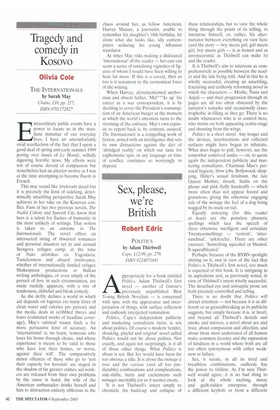Tragedy and comedy in Kosovo
Olivia Cole
THE INTERNATIONALS by Sarah May Chatto, £10, pp. 217, ISBN 0701172827 Extraordinary public events have a power to locate us in the mundane minutiae of our everyday lives. I have an uncomfortably vivid recollection of the fact that I spent a good deal of spring and early summer 1999 poring over issues of Le Monde, wilfully digesting horrific news. My efforts were not of course devoid of compassion but nonetheless had an ulterior motive as I was at the time attempting to become fluent in French.
This may sound like irrelevant detail but it is precisely the kind of sidelong, determinedly unsettling perspective Sarah May achieves in her take on the Kosovan conflict. Fans of her two previous novels, The Nudist Colony and Spanish City, know that hers is a talent for flashes of humanity in the most unlikely of settings. That notion is taken to an extreme in The Internationals, The novel offers an intersected string of thwarted romances and personal disasters set in and around Stengova refugee camp, at the time of Nato airstrikes on Yugoslavia. Tastelessness and absurd irrelevancy, whether of internationally funded refugee Shakespeare productions or Balkan writing anthologies, or even simply of the pursuit of love in such circumstances, are made ruefully apparent, with a mix of tenderness, disbelief and bleak comedy.
As she deftly defines a world in which aid depends on logistics (so many litres of clean water and calories per person) and the media deals in scribbled threes and fours (estimated weeks of headline coverage), May's satirical stance finds a far more persuasive kind of accuracy. An 'international' is, we learn, 'someone who loses his home through choice, and whose experience is meant to be valid to those who have lost their homes, or worse, against their will'. The comparatively minor offences of those who go to 'test their capacity for heroism' are staged in the shadow of far greater crimes: aid workers are released from their own problems by the cause in hand, the wife of the American ambassador drinks herself and him to distraction entirely oblivious to the chaos around her, as fellow American, Harvey Mauser, a journalist, unable to remember his daughter's 18th birthday, let alone what she looks like, idly contemplates seducing his young Albanian translator.
At times May risks making a dislocated
'international' of the reader her cast can seem a series of tantalising vignettes of figures of whom I would have been willing to hear far more. If this is a caveat, then so too is it testament to the economical force of the writing.
When Harvey, aforementioned anchorman and absent father, Mcfmks up' his career as a war correspondent, it is by deciding to cover the President's consumption of an American burger at the moment at which the world's attention turns to the storming of the embassy. May's own capacity to report back is, by contrast, assured. The Internationals is a compelling work of fiction, armed with an intelligence that sets its own distractions against the diet of 'abridged reality' on which our taste for euphemistic spin, in any language or time of conflict, continues so worryingly to depend.










































































 Previous page
Previous page